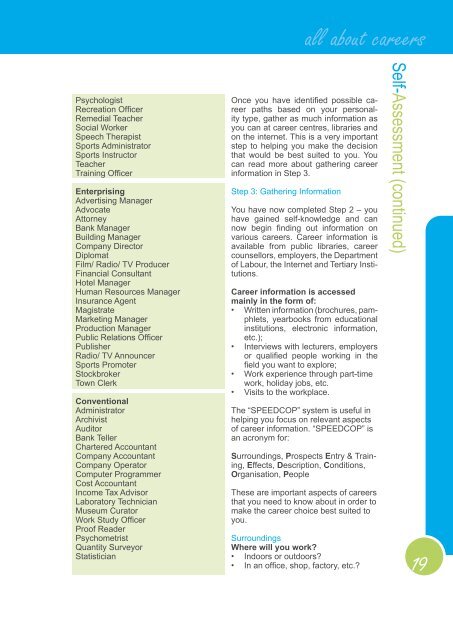CAREER - My SA Career Guide
CAREER - My SA Career Guide
CAREER - My SA Career Guide
You also want an ePaper? Increase the reach of your titles
YUMPU automatically turns print PDFs into web optimized ePapers that Google loves.
Psychologist<br />
Recreation Offi cer<br />
Remedial Teacher<br />
Social Worker<br />
Speech Therapist<br />
Sports Administrator<br />
Sports Instructor<br />
Teacher<br />
Training Offi cer<br />
Enterprising<br />
Advertising Manager<br />
Advocate<br />
Attorney<br />
Bank Manager<br />
Building Manager<br />
Company Director<br />
Diplomat<br />
Film/ Radio/ TV Producer<br />
Financial Consultant<br />
Hotel Manager<br />
Human Resources Manager<br />
Insurance Agent<br />
Magistrate<br />
Marketing Manager<br />
Production Manager<br />
Public Relations Offi cer<br />
Publisher<br />
Radio/ TV Announcer<br />
Sports Promoter<br />
Stockbroker<br />
Town Clerk<br />
Conventional<br />
Administrator<br />
Archivist<br />
Auditor<br />
Bank Teller<br />
Chartered Accountant<br />
Company Accountant<br />
Company Operator<br />
Computer Programmer<br />
Cost Accountant<br />
Income Tax Advisor<br />
Laboratory Technician<br />
Museum Curator<br />
Work Study Offi cer<br />
Proof Reader<br />
Psychometrist<br />
Quantity Surveyor<br />
Statistician<br />
all about careers<br />
Once you have identifi ed possible career<br />
paths based on your personality<br />
type, gather as much information as<br />
you can at career centres, libraries and<br />
on the internet. This is a very important<br />
step to helping you make the decision<br />
that would be best suited to you. You<br />
can read more about gathering career<br />
information in Step 3.<br />
Step 3: Gathering Information<br />
You have now completed Step 2 – you<br />
have gained self-knowledge and can<br />
now begin fi nding out information on<br />
various careers. <strong>Career</strong> information is<br />
available from public libraries, career<br />
counsellors, employers, the Department<br />
of Labour, the Internet and Tertiary Institutions.<br />
<strong>Career</strong> information is accessed<br />
mainly in the form of:<br />
• Written information (brochures, pamphlets,<br />
yearbooks from educational<br />
institutions, electronic information,<br />
etc.);<br />
• Interviews with lecturers, employers<br />
or qualifi ed people working in the<br />
fi eld you want to explore;<br />
• Work experience through part-time<br />
work, holiday jobs, etc.<br />
• Visits to the workplace.<br />
The “SPEEDCOP” system is useful in<br />
helping you focus on relevant aspects<br />
of career information. “SPEEDCOP” is<br />
an acronym for:<br />
Surroundings, Prospects Entry & Training,<br />
Effects, Description, Conditions,<br />
Organisation, People<br />
These are important aspects of careers<br />
that you need to know about in order to<br />
make the career choice best suited to<br />
you.<br />
Surroundings<br />
Where will you work?<br />
• Indoors or outdoors?<br />
•<br />
In an offi ce, shop, factory, etc.?<br />
Self-Assessment (continued)<br />
19


